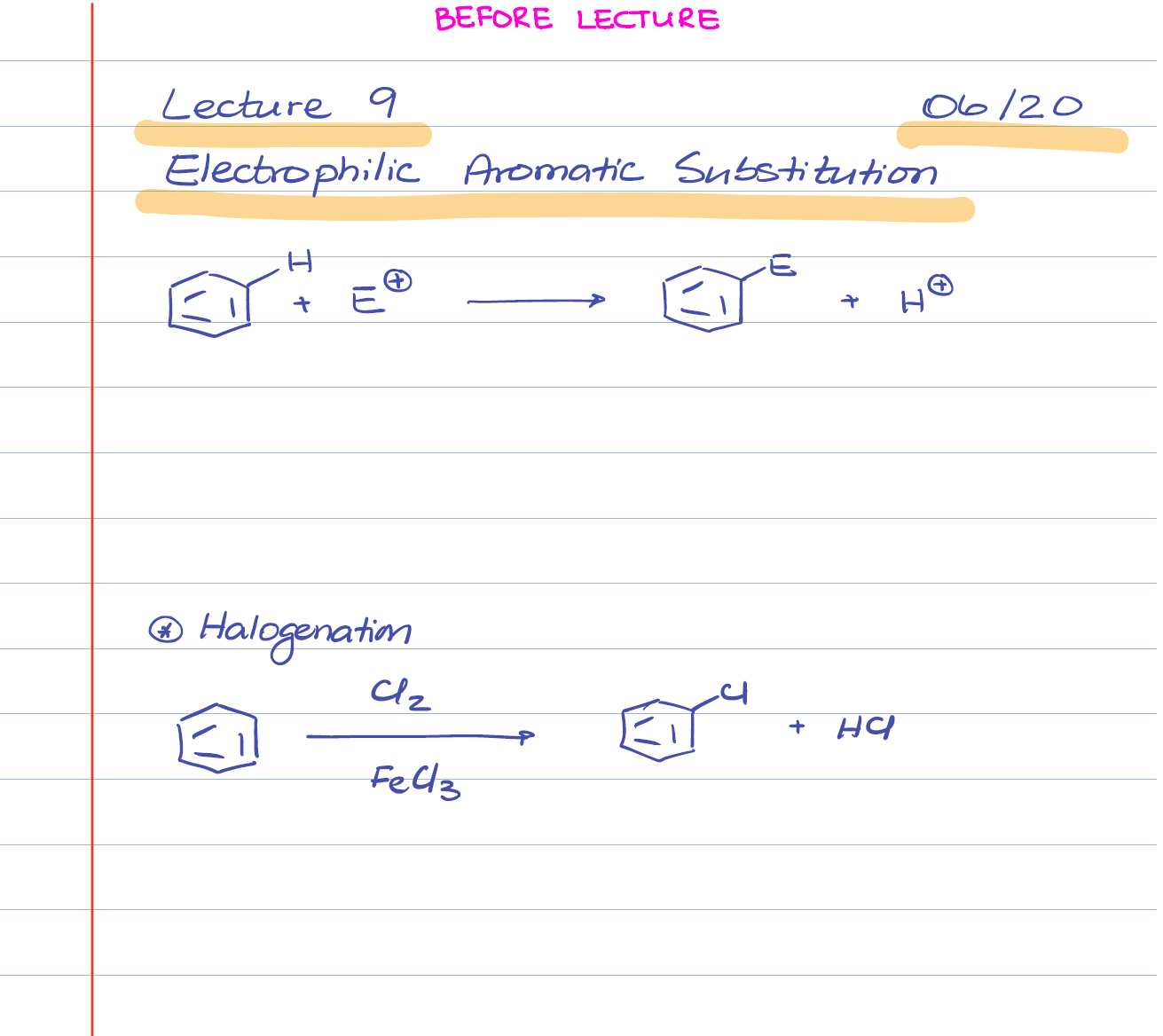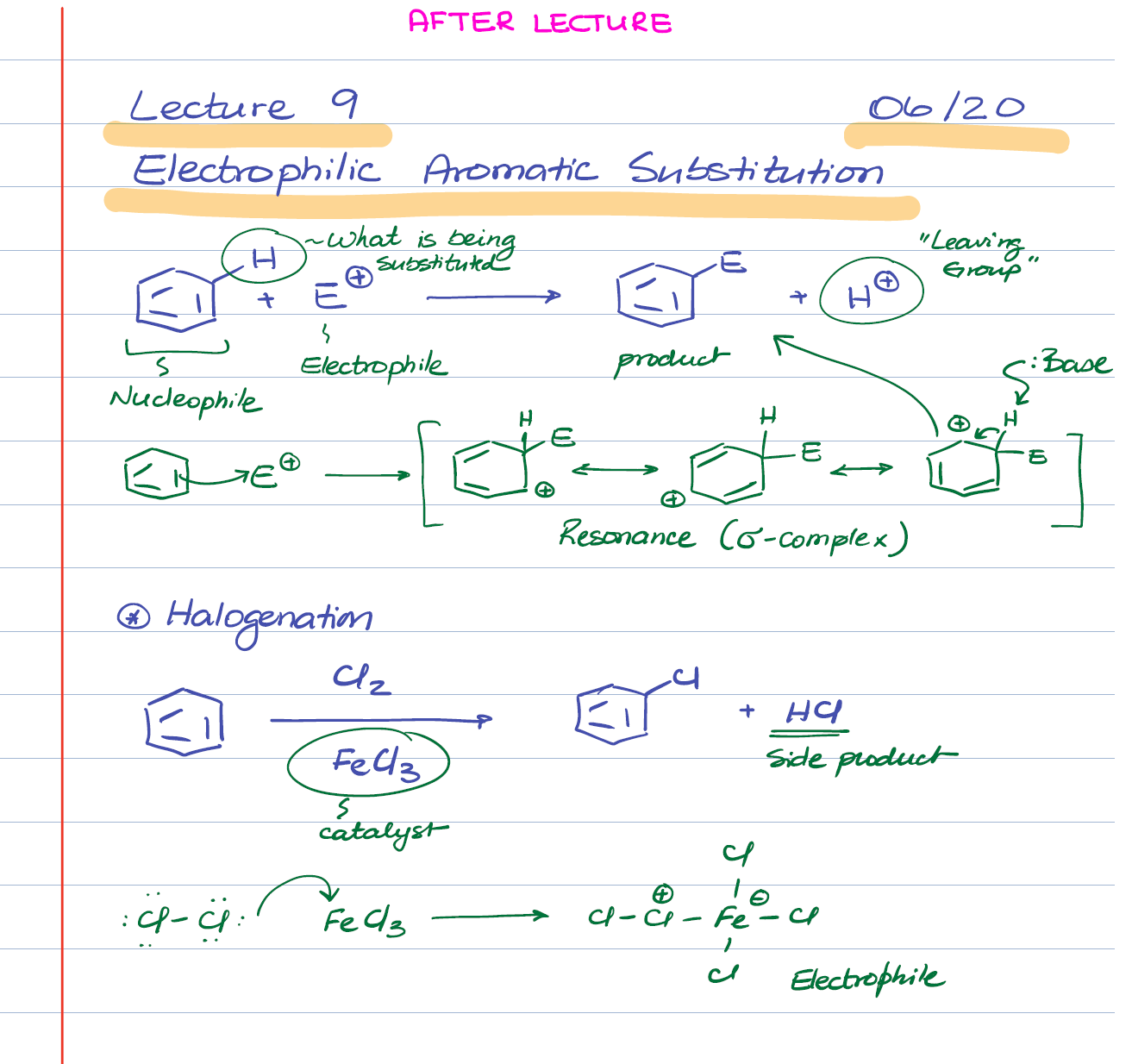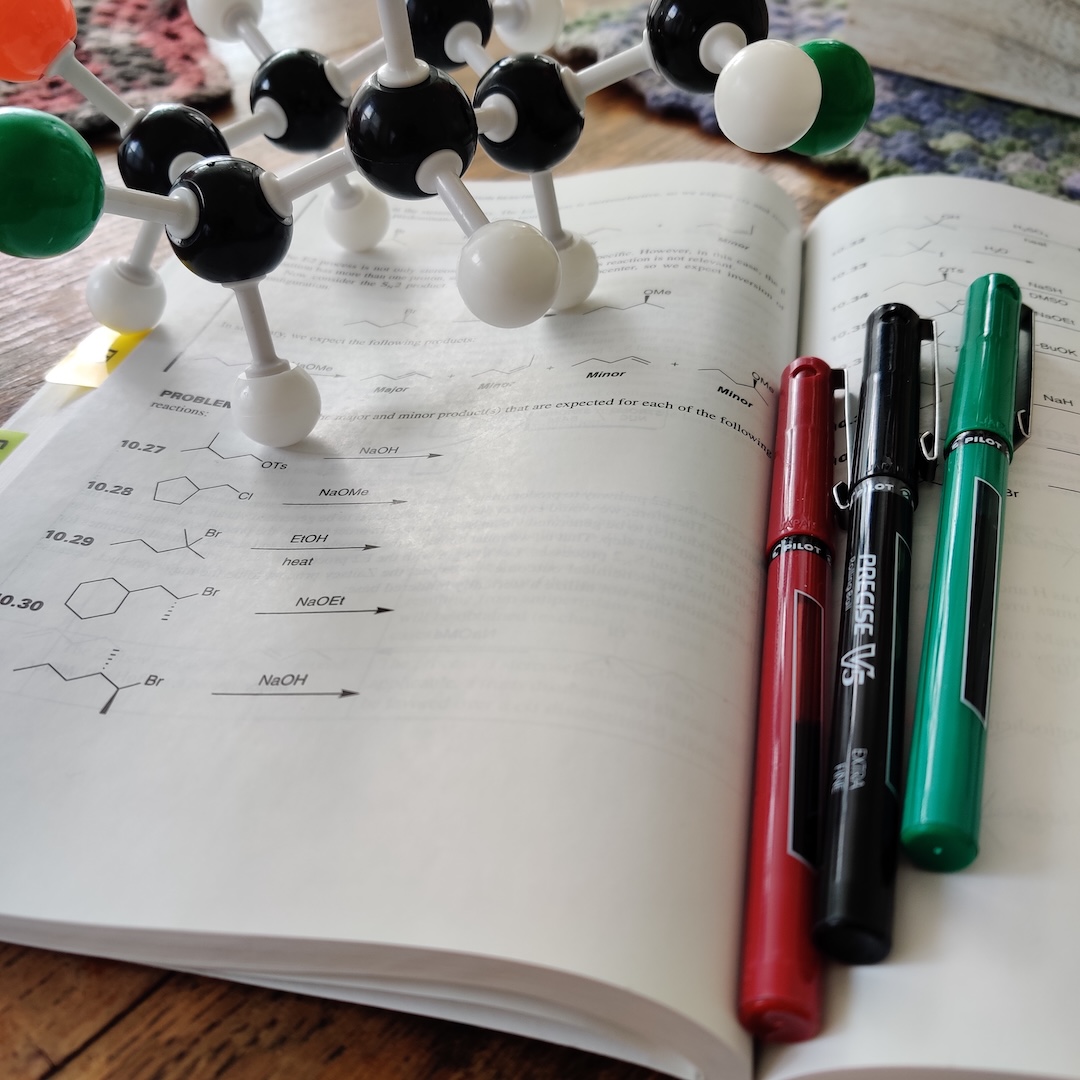Taking Summer Organic Chemistry Course Online: What to Expect and How to Prepare
Summer organic chemistry classes are generally tougher than the regular fall or spring ones. A typical semester is 12 to 16 weeks long. However, you’ll be covering the same amount of material in 8-10 weeks in the summer. Additionally, some summer classes aim to jam the entire 2-semester sequence over the summer making it extremely information dense.
During a regular organic chemistry semester, you can expect to cover about one chapter per week. So, talking about it from the perspective of the textbook pages, you’re looking at reading 50-70 pages per week. This averages to about 10 pages per day, give or take. We’re also talking about organic chemistry, which is a science. So, those are not “easy” 10 pages like in a history or social studies textbooks.
Plus, of course, you’ll have homework to do, lectures to watch, and notes to take every week. But this is a regular semester. In the summer, you’ll be covering close to a whole organic chemistry chapter per day or two! Sometimes even more. Which means that all the work you are used to do for your classes throughout the week, you’ll have to be doing daily. You won’t have much time for anything else. Be morally prepared to it! Yes, some instructors will omit a few topics or concepts here and there for the sake of time. But don’t expect it to make the class much easier.
Organic chemistry is a hard class. And by taking it in the summer, you’re making it even harder. So, what can you do to manage all the work and succeed in your summer organic chemistry?
Well, I have a few suggestions!
Schedule Everything
Summer organic chemistry will require a lot of scheduling.
Schedule the time when you’ll be watching the online lectures. Put it on your calendar as if it was a regular class. And what’s more important, stick to your schedule!
If you’re planning on taking notes while watching your online organic chemistry lectures (and you should), allot yourself more time than the lecture length. It’s easy to pause the video for a few moments to jot down a note. And it may seem like it won’t take much time. However, a moment here and a moment there will pile up fast and you’ll spend a lot more time in your virtual class than you initially expected. My rule of thumb is to give yourself extra 15 min for each hour of the lecture time to accommodate notetaking.
Resist, however, taking the verbatim notes or copying everything off the board word-by-word. First, it’ll take you forever. Second, it’ll get you to the mindless copy mode. Instead, pause the video every 5-10 minutes or whenever it’s logical, give it a little thought and reflect on what you’ve heard by summarizing the key points.
Many of my students found the following approach to online organic chemistry classes to be very productive:
- Quickly skim through the video and jot down reactions and examples giving ample space in between those for additional notes.

- Watch the video again focusing on what instructor is saying adding the comments and annotations to your reactions and examples that you wrote down in the first run.

If your instructor gives you the powerpoint slides that you can fill in during the online lecture, you can skip the first part.
Schedule the time you’re going to spend on the homework.
Yes, it may sound a little weird, but it is particularly important! Many online organic chemistry courses are self-paced. So, it is easy to put off some work for later. But remember what I have mentioned at the beginning of this post? Summer courses are really concentrated and labor-intensive! Your slack today means twice as much work tomorrow… which is going to be next to impossible to accomplish physically, so you’ll postpone more work, and them more work, and then more work… till it avalanches and buries you under. Don’t do it to yourself!
You’ll also have a lot of organic chemistry homework. Between reading your textbook, reworking some lecture examples, doing the online homework (sapling, webassign, or whatever else you might be using in your course), and updating your notes, you’re looking at a week-worth of work done in a span of 1-2 days! It’s a lot of work. Most of this work won’t be easy either. So, make sure you’re not trying to cram it all in one sitting. I know some students are quite used to doing the 8-hour study sessions. Don’t do it! We have years of research evidence showing that this doesn’t work. Break your study and homework sessions into small manageable chunks. I suggest study sessions no longer than 90 minutes before you have to take a 15-20 minute break.
Add All Important Dates to Your Calendar
Summer classes are fast paced, so make sure you don’t get behind with any assignments or due dates. Use a calendar of your choice and add all due dates to it as soon as you get your syllabus or the dues date it announced.
Unfortunately, some instructors use the same syllabus template without specific dates every semester. It’s frustrating and, in my humble opinion, show what a lazy 🍑 your instructor is, but there’s nothing you can do about it. So, scour the learning management system (blackboard, canvas, moodle, etc.) you’re using in your organic chemistry course for this information. If you’re using the online homework system, you’ll have the due dates on each assignment. Once you have this information,
Add all due dates to your calendar and set reminders!
Adding all those dates to the calendar will save you from spacing out and forgetting an important date. I can tell you from experience, most instructors are not going to be forgiving of your tardiness. So, don’t expect an extension because your instructor is nice.
Now, what if you don’t have any due dates and everything is due the last day of classes? Situations like that happen too and you may have a setup just like that in your summer organic chemistry class. If that’s the case, give yourself deadlines and add those to your calendar. Treat those as if your instructor gave you those deadlines. I can guarantee that if you don’t space out your assignments and try to cram them all at the end of the course, you’re going to get overwhelmed and you’ll fail many of them.
Doing the assignments along with the course will also help you gauge where you are in terms of your understanding of the material and if you’re struggling with any topics. Nothing is worth than the realization that you don’t know the material very well at the end of the course! Listening to lectures or watching YouTube videos may give you the false sense of understanding. Don’t kid yourself, you need to work through plenty of examples before you can say that you feel comfortable with the material. This is where working on the organic chemistry homework assignments daily helps the most.
Make an Online Study Group
Taking organic chemistry classes online limits your social outreach and your opportunities to work with other people. Or so it may seem! In reality, you can just as easily make online study groups and work through problems via Skype or Zoom calls. Pretty much every online class has a class list or a discussion forum. So, if you’re looking to make an online discussion group, you can always give a shoutout via the class list or class forum.
Actively participate in online discussions!
Once you have your organic chemistry study group in place, schedule the regular group meetings with you peers. This will accomplish two goals. First, by working with other people and brainstorming during these sessions, you can find answers to questions when you’re stuck. You’ll also understand the material way better if you explain the concepts to someone else. And second, it will help you keep up with your schedule since you’ll be feeling responsible to show up and participate in the group.
Your instructor may have a group chat, or a forum dedicated to the class. It’s an excellent idea to participate in those as well. You’ll see what problems other students are having and you’ll be able to help others with the stuff you understand well. And as I’ve mentioned above, this is a good place to make a permanent online study group.
Line-Up Help Ahead of Time
Summer organic chemistry classes are demanding and fast paced. Organic chemistry has a rep of a “weeder” class for a reason—it is one of the hardest classes in a college curriculum. So, make sure you line up help ahead of time.
Are you planning on getting an online organic chemistry tutor? Then make sure your tutor is available and not taking a summer vacation during your class time.
Do you know a few friends that are taking online organic chemistry this summer? Get in touch with them and make an online study group. It doesn’t matter if you guys are taking the same class or are taking your course from different instructors. Organic chemistry curriculum is relatively uniformed between the schools, so you all are going to be covering same topics.
Do you have all your textbook and supplemental materials ready? Do you have your textbook? Your molecular model kit? Your workbook? Get them as soon as you can. Remember, summer organic chemistry flies fast, so you don’t have a week at the beginning of your class to get your stuff together, so act now.
Are you taking organic chemistry this summer? Let me know in the comments below and tell me what you’re most excited about!


Hello Victor,
It feels like a miracle that I stumbled on your site. I am in the last week of what has been the most excruciating class of my life! Yes, I am not exaggerating. I am in General Chemistry and have scored only in the mid 60’s for tests. This is normal? I have studied, done every problem in the textbook, worked with an online tutor. I have been so diligent and great at the labs that I will probably pull out a high C (never have I ever) or low B. I am cutting my losses though and will take Chem II at another community college and then organic chemistry online….your article is terrifying! Thank you for the advice. I will look for the David Klein book and no doubt will need to engage your tutoring services in the future. Maybe there is hope after all .
Hey Heidie,
Thanks for your comment. I’m just being realistic here. Summer organic chemistry classes are tough. I wrote this piece when we were in a COVID lockdown so most students were taking online classes. Those are still quite popular, so most of this information will be still useful for you as well. In-person summer organic chemistry is just as hard to pull off. You’ll also see that general chemistry and organic chemistry are quite different from each other. I’ve talked about the differences extensively in my social media but I think it might be a good idea to actually put together a post outlining all the differences and the best approaches to organic.
It also does seem like you’re putting a ton of work to succeed in your class. In my experience, if you’re putting in so much work and not getting the result you want it because of some sort of mismatch. I suspect that the textbook questions are not the same style or complexity that you’re seeing on your tests. Thus, you may not be adequately preparing yourself to your tests. But I’m just guessing here. An experienced tutor will definitely be able to provide you with the practice materials that would be in-line with your class material level and complexity.
Hi I am looking for summer online organic chemistry courses to get ready for next academic year
Please let me know about details
Thanks
Alex
Hi, Alex. There aren’t that many organic “prep” courses per se, let alone online ones. I know of the summer organic prep course at Duke university, which starts mid May. You may wanna check with them if they have a spot to accept you in or what their requirements are. There used to be some very decent courses on Coursera for organic chemistry. Not sure if they still exist though.
Another option would be to do some self-paced study and prep for the class. I highly recommend David Klein’s “Organic chemistry as a second language” books which are easy to digest yet give a decent foundation for the material. They are not as exhaustive or detailed as a typical textbook, but they are a good place to start.
I also offer summer organic chemistry “preview” individual and group tutoring where I work with students to review some fundamental general chemistry concepts that map onto organic chemistry curriculum and do a preview of the fundamental organic chemistry topics that students struggle with at the beginning of organic chemistry sequence. If you’re interested in something like that, send me a message.